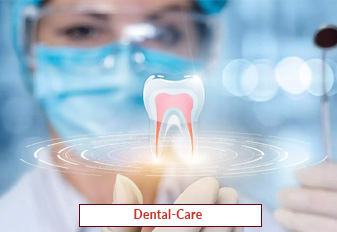Dental Care
The purpose of dental care, an important branch of medicine, is to maintain and promote oral health. From childhood until adulthood, effective dental care may help someone retain healthy teeth and gums. Brushing and flossing twice a day, stopping smoking, eating a healthy diet, and having regular dental check-ups can help people avoid cavities, gum disease, and other dental issues.
About
The term “dental care” encompasses a wide range of treatments and procedures designed to maintain oral health and address dental issues. It includes both individual behaviours used to avoid problems and professional therapies provided by oral healthcare professionals. If teeth are not cleaned thoroughly regularly, plaque collection can lead to tooth decay or gum disease. If plaque is not removed, it hardens into tartar, which becomes lodged at the tooth’s base. Taking good care of your teeth and gums can help you avoid problems like gum disease (gingivitis or periodontitis) and tooth decay (caries).

Anything that entails a dentist or other dental professional working on your mouth is considered a dental procedure. Dental operations include crowns or fillings for teeth, gum disease therapy, orthodontics for crowded teeth, oral surgery, and denture fabrication. Even with thorough brushing and flossing, plaque can still accumulate. Fortunately, regular dental cleanings by a dentist can eliminate it. This is crucial for accessing places that are challenging to reach on your own. Scaling and polishing are included in professional cleaning.
- Root Canal– Most people agree that the most popular kind of dental surgery is a root canal. Every year, millions of teeth are treated, many of which are spared from extraction and are freed from sensitivity and pain. In most cases, root canal therapy is painless and quite successful in alleviating pain.
- Dental Implants– Over the past 25 years, dental implants have altered the course of dentistry. An implant serves as a substitute for a tooth’s root or roots. They employ titanium and titanium alloy to fasten crowns to the jawbone. These metals are utilized because they are biocompatible, or accepted by the body, and lightweight.
- Wisdom Teeth Extractions– Four adult teeth at the back, bottom, and top corners of your mouth are extracted when you have wisdom teeth extractions. The last (third) molars to erupt are these, and they typically do so between the ages of 17 and 25. Wisdom teeth can become impacted and result in discomfort, oral infections, or other dental issues if they are not given enough space to erupt. Oftentimes, dentists will suggest wisdom tooth removal even if impacted teeth are not an issue, as a preventative measure.
- Cosmetic– Cosmetic dental surgery comes in many different forms. Many times, cosmetic surgery is not a medically necessary procedure but is used to improve the patient’s face or smile. Cosmetic procedures cover minor treatments like teeth whitening and investments like orthodontics.
